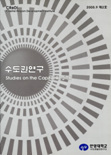우리나라의 도시경쟁력 요인분석에 관한 연구
A Study on the Causality of Urban Competitiveness in Korea
- 안양대학교 수도권발전연구소
- 수도권연구
- 제6호
-
2009.111 - 28 (28 pages)
- 85

This study is aimed at both reviewing the concept of urban competitiveness and investigating the causal relationship between the competitiveness and its explanatory variables of Korea in 2000 and 2007. Another attempt is also made to suggest policy implications for strengthening urban competitiveness and raise a few research limitations to be overcome in the future. The selected cities in this study included 31 localities having the population of 300,000 persons and more as of 2007. And the indicators representing urban competitiveness were comprised of 15 variables such as socio-economic, infrastructure, educational and cultural sectors. Analytical methods applied in this study consisted of two categories. One was the factor analysis, and the other was the stepwise multiple regression model. In particular, the multiple regression analysis was carried out to investigate both static and dynamic relationships in urban competitiveness. Based on such research design, the results of factor analysis indicated that manufacturing sector appeared to be the most important factor in urban competitiveness in both 2000 and 2007. However, one of the producer's services, that is, finance and insurance services were relatively important factor in 2007. On the other hand, it was likely that the independent variable of finance and insurance services had the highest explanatory power in both static and dynamic regression analysis. The next important explanatory variables included infrastructure and education. And the number of foreign residents representing the level of globalization revealed the third important variable in 2007 as expected. In spite of such major findings, this study has some limitations. First, the quality aspect of urban competitiveness such as citizens' subjective value judgement was not taken into account in measuring the causal relationship. The quantification of such quality aspect is needed to derive more comprehensive results in investigating urban competitiveness. Second, it is highly recommended to select and collect relevant data by constructing the operational concept of urban competitiveness. Otherwise, the results may differ from author to author. Third, the dependent variable indicating the competitiveness is also needed to be defined more clearly on the basis of theoretical ground. It is expected that such limitations are able to be overcome in future researches.
I. 머리말
II. 도시경쟁력의 개념과 사례
III. 도시경쟁력 분석의 틀과 방법론
IV. 도시경쟁력의 요인과 인과관계 분석
V. 맺음말
참고문헌
ABSTRACT
(0)
(0)